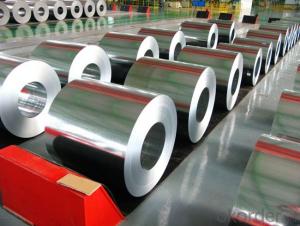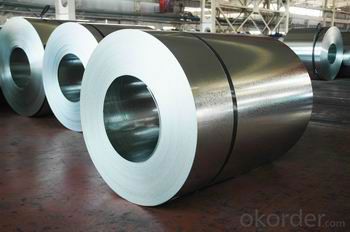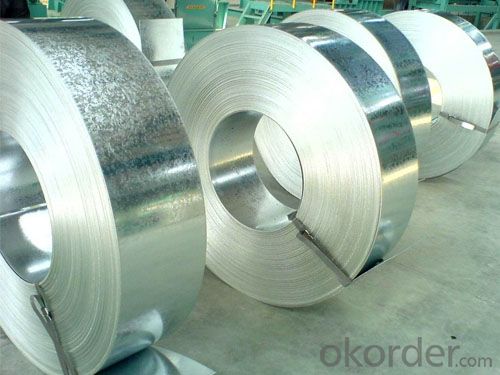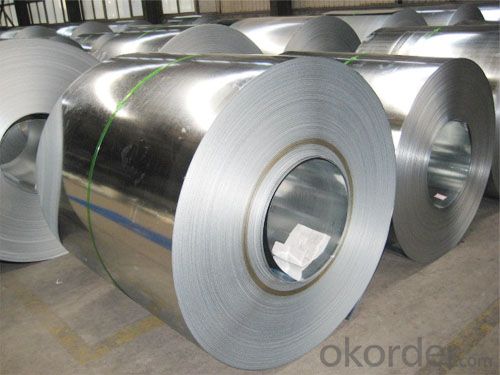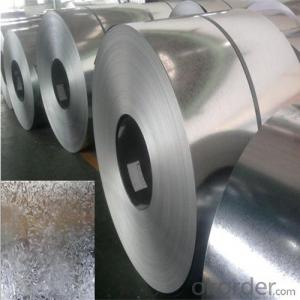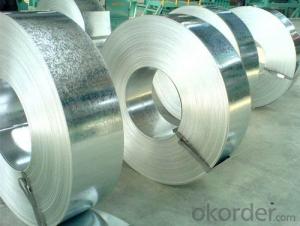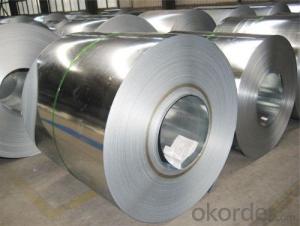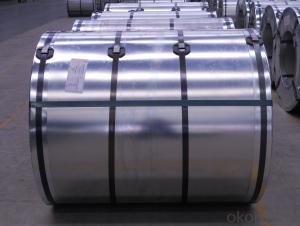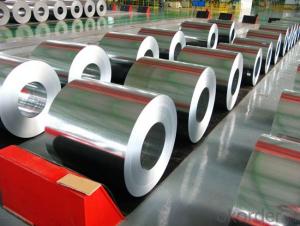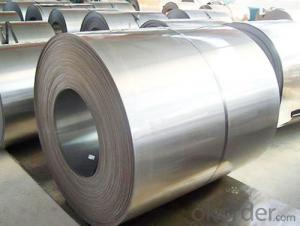HOT-DIP GALVANIZED STEEL COIL WITH SUPER HIGH QUALITY
- Loading Port:
- Tianjin
- Payment Terms:
- TT OR LC
- Min Order Qty:
- 25 m.t.
- Supply Capability:
- 5000 m.t./month
OKorder Service Pledge
OKorder Financial Service
You Might Also Like
Quick Details | |||||
Standard: | AISI,ASTM,BS,DIN,GB,JIS | Grade: | SGCC,DX51D/DX52D/S250,280GD | Thickness: | 0.12-4.0 mm |
Place of Origin: | China (Mainland) | Brand Name: | N/M | Model Number: | ssp-226 |
Type: | Steel Coil | Technique: | Cold Rolled | Surface Treatment: | galvanized/ Galvalume/zinc coatting |
Application: | strong anti-corrosion ability,cold bending molded manufacturablity | Special Use: | High-strength Steel Plate | Width: | 600-1250 mm |
Length: | in coil | product: | g40 prime/secordary hot-dip galvanized cold rolled steel coil/sheet | ||
Packaging & Delivery | |||||
Packaging Detail: | standard export package,Other types of packing can be customized as per client's requirement. | ||||
Delivery Detail: | as per client's requirements | ||||
Specifications
1.Mateials:SGCC,DX51D / DX52D / S250,280GD
2.Size:width:600-1250mm(900mm,1215mm,1250mm,1000mm the most common)
thickness:0.15-2.0mm
length:1000-6000mm,as your require
3.Zinc coating :60-180g( as required)
4.Coil id:508mm
5.Coil weight: 3-5MT(as required)
6. Surface:regular/mini/zero spangle, chromated, skin pass, dry etc.
7. Application:
With excellent cold bending molded manufacturablity, good decoration effect, strong anti-corrosion ability, galvanized steel coils and sheets are also pollution-free and easily recycled. Accordingly, they can be used as final products and basic plates of color coated steel coils.
8.Packaging Details:
Standard export package.
Other types of packing can be customized as per client's requirements.
- Q: What are the main characteristics of galvanized steel coils?
- The main characteristics of galvanized steel coils include a protective zinc coating that prevents corrosion, high strength and durability, excellent formability and weldability, and a smooth and shiny surface finish.
- Q: What are the different types of steel coatings used on coils?
- There are several types of steel coatings used on coils, including galvanized coatings, galvannealed coatings, and organic coatings.
- Q: How are steel coils processed and treated?
- Steel coils are processed and treated through a series of steps to ensure their quality and suitability for various applications. The process begins with uncoiling the steel coil, which involves removing the outer layers of protective wrapping and unwinding the coil. Once uncoiled, the steel is inspected for any defects, such as cracks or uneven surfaces. Next, the steel coil goes through a cleaning process to remove any dirt, oil, or rust present on its surface. This is typically done using a combination of chemical cleaning agents and mechanical scrubbing. After cleaning, the coil is rinsed and dried to prevent any residual moisture from causing corrosion. Once cleaned, the steel coil can undergo various treatments depending on its intended use. One common treatment is pickling, which involves immersing the coil in an acidic solution to remove impurities and scale. This process helps to improve the surface finish and prepares the steel for further processing. After pickling, the coil may be subjected to cold rolling, a process that reduces its thickness and improves its dimensional accuracy. Cold rolling involves passing the steel through a series of rollers at room temperature, gradually reducing its thickness and increasing its strength. This process also improves the surface finish of the steel coil. In some cases, the steel coil may undergo additional heat treatment processes, such as annealing or tempering. Annealing involves heating the coil to a specific temperature and then slowly cooling it, which helps to relieve internal stresses and improve its mechanical properties. Tempering, on the other hand, involves reheating the coil to a lower temperature and then cooling it rapidly. This process enhances the strength and toughness of the steel. Once the desired processing and treatments are complete, the steel coil may be coated or painted to provide additional protection against corrosion or to enhance its aesthetic appearance. Coating processes can include hot-dip galvanizing, electroplating, or applying organic coatings such as paint or powder coatings. Finally, the processed and treated steel coils are typically cut into specific sizes or shapes based on customer requirements. This can be done using various cutting methods such as shearing, slitting, or sawing. Overall, the processing and treatment of steel coils involve a combination of cleaning, pickling, rolling, heat treatment, coating, and cutting processes. These steps are carefully carried out to ensure the quality, strength, and suitability of the steel for its intended applications.
- Q: How are steel coils used in the manufacturing of body panels?
- Steel coils are used in the manufacturing of body panels as they are rolled into flat sheets and then cut and shaped to form the desired body panel design. These coils provide the necessary strength and durability required for automotive body panels, ensuring that they can withstand the rigors of everyday use and provide structural integrity to the vehicle.
- Q: How are steel coils labeled for identification?
- Steel coils are typically labeled for identification using a combination of unique alphanumeric codes, barcodes, or labels that include important information such as the coil's dimensions, weight, grade, production date, and supplier details.
- Q: How long can steel coils be stored?
- Steel coils can be stored for an extended period, typically up to six months to a year, depending on the specific type of steel and its storage conditions.
- Q: What are the uses of galvanized steel coils?
- Due to their unique properties, galvanized steel coils find extensive usage in diverse industries. The following are some prevalent applications of galvanized steel coils: 1. Construction: Galvanized steel coils are extensively employed in the construction sector for various purposes. They are utilized in the production of roofing sheets, wall panels, and structural components. The galvanized coating safeguards the steel from corrosion, thus increasing its lifespan and ensuring durability even in harsh weather conditions. 2. Automotive industry: The automotive industry relies on galvanized steel coils for the production of different parts and components. These coils are instrumental in manufacturing body panels, chassis, and other structural elements of vehicles. The galvanized coating provides exceptional resistance against corrosion, a vital factor for automobile longevity. 3. Appliances: Galvanized steel coils are employed in the manufacturing process of diverse household appliances, including refrigerators, washing machines, and air conditioners. These coils are used to fabricate the outer panels and cabinets of these appliances, offering them a robust and durable structure. 4. Agriculture: Galvanized steel coils also find applications in the agricultural sector. They are utilized in the production of agricultural equipment, such as grain storage silos, irrigation systems, and livestock enclosures. The galvanized coating protects the steel from rust and corrosion, ensuring the safety and longevity of these agricultural structures. 5. Industrial applications: Galvanized steel coils are widely employed in multiple industrial applications. They are utilized in the manufacturing of ductwork, ventilation systems, and industrial piping. The galvanized coating aids in resisting chemicals, moisture, and other environmental factors, making it an ideal choice for industrial environments. 6. Electrical industry: The electrical industry relies on galvanized steel coils for the production of electrical enclosures, conduit pipes, and cable trays. The galvanized coating offers excellent protection against corrosion, ensuring the safety and durability of electrical installations. 7. Furniture manufacturing: Galvanized steel coils are utilized in the furniture manufacturing industry for the production of furniture frames, shelves, and cabinets. The galvanized coating enhances the strength and durability of these furniture pieces, making them long-lasting and resistant to corrosion. In conclusion, galvanized steel coils are extensively used in various industries due to their exceptional resistance to corrosion, durability, and strength. They represent a cost-effective and dependable choice for applications that require protection against rust and environmental factors.
- Q: How do steel coils contribute to energy savings in buildings?
- Steel coils contribute to energy savings in buildings by being used in various applications that help improve insulation and reduce heat transfer. They are commonly used in HVAC systems, where they act as heat exchangers, transferring heat between air streams. Steel coils with high thermal conductivity ensure efficient heat transfer, allowing for effective cooling or heating of air without excessive energy consumption. Additionally, steel coils are utilized in the construction of insulated walls and roofs, forming an integral part of the building envelope. This helps minimize thermal bridging, preventing heat loss or gain through the building's structure. By improving insulation and reducing energy transfer, steel coils play a crucial role in enhancing the overall energy efficiency of buildings, leading to significant energy savings.
- Q: Can steel coils be stored in unheated warehouses?
- Yes, steel coils can be stored in unheated warehouses as long as proper precautions are taken to prevent moisture and corrosion.
- Q: Its big and expensive and i don't know if it would have a logical purpose but its sharp as hell and awesome. Anyways, its made from surgical steel and all i have found on the internet is that its probably 316L (w/e that means). I have another knife made from 440 stainless steel and as far as i know that is pretty much the hardest stainless metal. So why would the more expensive one be made from surgical steel?
- This Site Might Help You. RE: Why would a knife be made from surgical steel? Its big and expensive and i don't know if it would have a logical purpose but its sharp as hell and awesome. Anyways, its made from surgical steel and all i have found on the internet is that its probably 316L (w/e that means). I have another knife made from 440 stainless steel and...
Send your message to us
HOT-DIP GALVANIZED STEEL COIL WITH SUPER HIGH QUALITY
- Loading Port:
- Tianjin
- Payment Terms:
- TT OR LC
- Min Order Qty:
- 25 m.t.
- Supply Capability:
- 5000 m.t./month
OKorder Service Pledge
OKorder Financial Service
Similar products
Hot products
Hot Searches
Related keywords
